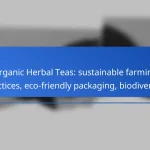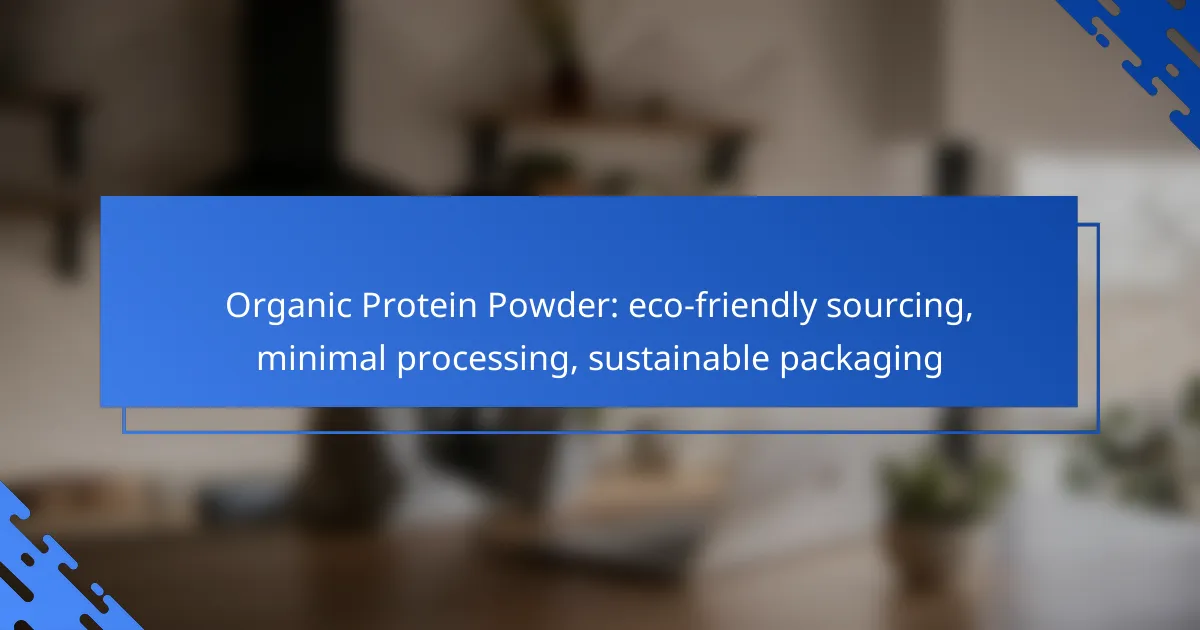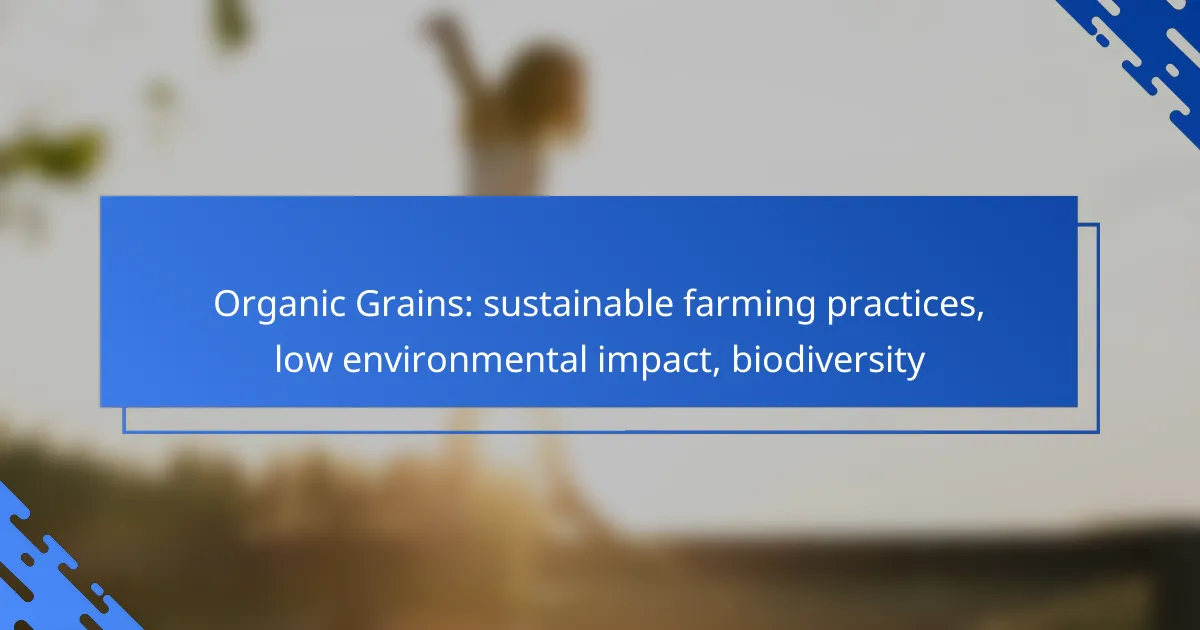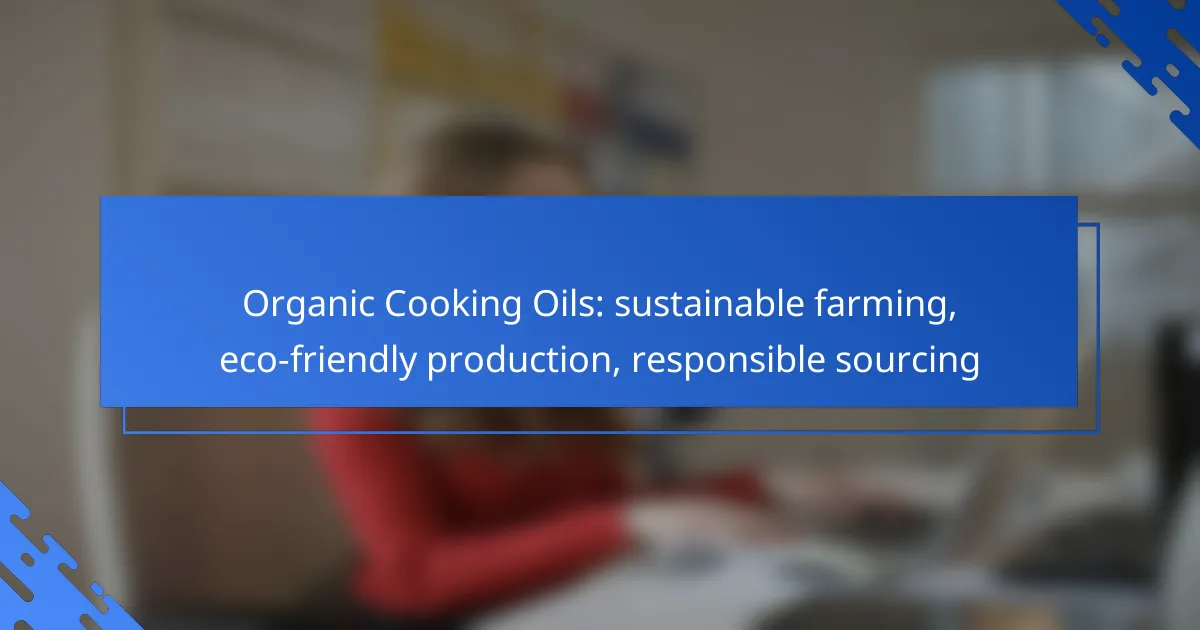Organic protein powders are an excellent choice for health-conscious consumers seeking eco-friendly options. These products are sourced sustainably through environmentally responsible farming practices and undergo minimal processing to retain their natural nutrients. Additionally, many brands prioritize sustainable packaging, making them a responsible choice for both personal health and the planet.

What are the best organic protein powders available in the US?
The best organic protein powders in the US are those that prioritize eco-friendly sourcing, minimal processing, and sustainable packaging. Popular options include Orgain Organic Protein Powder, Vega One All-in-One Shake, and Garden of Life Organic Protein, each offering unique benefits and formulations to suit various dietary needs.
Orgain Organic Protein Powder
Orgain Organic Protein Powder is known for its clean ingredients and great taste. This powder combines plant-based proteins, such as pea, brown rice, and chia seeds, providing a balanced amino acid profile. It is free from artificial flavors and preservatives, making it a popular choice for health-conscious consumers.
When selecting Orgain, consider its versatility; it can be easily mixed into smoothies, baked goods, or oatmeal. The product is also certified organic, ensuring that the ingredients are sourced sustainably and without harmful pesticides.
Vega One All-in-One Shake
Vega One All-in-One Shake offers a comprehensive nutritional profile, combining protein with vitamins, minerals, and greens. This powder is made from a blend of pea protein, hemp protein, and sprouted grains, making it a suitable option for those seeking a meal replacement or post-workout recovery.
One key feature of Vega One is its commitment to sustainability, with packaging made from recycled materials. It is also non-GMO and gluten-free, appealing to a wide range of dietary preferences. Keep in mind that the flavor can be quite strong, so it may be best enjoyed blended with fruits or nut milks.
Garden of Life Organic Protein
Garden of Life Organic Protein is a top choice for those looking for a clean, plant-based protein source. This powder features a blend of organic pea protein, brown rice protein, and other plant ingredients, ensuring a complete amino acid profile. It is also free from dairy, soy, and gluten, making it suitable for various dietary restrictions.
Additionally, Garden of Life emphasizes eco-friendly practices, with its products being certified organic and packaged in recyclable materials. When using this protein powder, consider adding it to smoothies or protein bars for a nutritious boost without compromising on taste or quality.

How is organic protein powder sourced sustainably?
Organic protein powder is sourced sustainably through eco-friendly farming practices that prioritize environmental health and resource conservation. This involves using natural methods to cultivate crops, ensuring minimal impact on ecosystems while providing high-quality protein products.
Farm-to-table practices
Farm-to-table practices emphasize direct sourcing from local farms, reducing transportation emissions and ensuring freshness. This approach supports local economies and allows consumers to trace the origin of their protein powder, fostering transparency in the supply chain.
When selecting organic protein powder, look for brands that highlight their partnerships with nearby farms. This not only promotes sustainability but also often results in better flavor and nutritional quality.
Regenerative agriculture methods
Regenerative agriculture methods focus on restoring soil health and biodiversity while producing crops. Techniques such as crop rotation, cover cropping, and reduced tillage help sequester carbon and enhance soil fertility, making them ideal for sustainable protein sourcing.
Brands that utilize regenerative practices often share their farming methods and certifications. Look for labels indicating compliance with recognized standards, as these can provide assurance of their commitment to sustainability and ecological balance.

What are the benefits of minimal processing in protein powders?
Minimal processing in protein powders enhances the overall quality by preserving nutrients and improving digestibility. This approach often results in a product that is closer to its natural state, making it more beneficial for health-conscious consumers.
Higher nutrient retention
Minimal processing helps retain essential nutrients that can be lost during extensive manufacturing. For instance, vitamins, minerals, and amino acids are better preserved when the protein powder undergoes fewer steps in its production. This means that consumers can enjoy a product that offers a higher nutritional profile.
When selecting protein powders, look for those that emphasize cold-pressed or low-heat processing methods. These techniques are less likely to degrade sensitive nutrients, ensuring that you receive the maximum benefit from each serving.
Better digestibility
Protein powders that are minimally processed are often easier to digest. This is because they contain fewer additives and preservatives, which can sometimes cause gastrointestinal discomfort. A cleaner ingredient list generally leads to a smoother digestive experience.
To enhance digestibility, consider protein sources like pea, hemp, or brown rice, which are commonly found in minimally processed options. These plant-based proteins are not only easier on the stomach but also provide a balanced amino acid profile, making them suitable for various dietary needs.

How does sustainable packaging impact the environment?
Sustainable packaging significantly reduces environmental harm by minimizing waste and resource consumption. It focuses on using eco-friendly materials and processes that lessen the overall ecological footprint of products.
Reduces plastic waste
Sustainable packaging often replaces traditional plastic with biodegradable or recyclable materials, which helps decrease the amount of plastic waste in landfills and oceans. For instance, using plant-based plastics or paper can lead to a notable reduction in non-biodegradable waste.
By choosing products with sustainable packaging, consumers can contribute to a circular economy where materials are reused rather than discarded. This shift not only helps the environment but also encourages manufacturers to innovate in their packaging solutions.
Encourages recycling
Eco-friendly packaging is typically designed to be easily recyclable, which promotes proper waste disposal practices among consumers. Clear labeling and instructions on how to recycle materials can significantly increase recycling rates.
Incorporating recycled materials into packaging can also create a demand for recycled products, further supporting recycling initiatives. Consumers can look for certifications, such as the Recycling Symbol, to ensure that the packaging is indeed recyclable and contributes to a sustainable lifecycle.

What certifications should I look for in organic protein powder?
When selecting organic protein powder, look for certifications that ensure the product meets strict standards for organic farming and ingredient integrity. Key certifications include USDA Organic and Non-GMO Project Verified, which indicate eco-friendly sourcing and minimal processing.
USDA Organic certification
The USDA Organic certification guarantees that the protein powder is made from ingredients grown without synthetic pesticides, herbicides, or fertilizers. To qualify, products must contain at least 95% organic ingredients and adhere to strict farming practices that promote environmental sustainability.
When shopping, check for the USDA Organic seal on the packaging. This certification not only ensures quality but also supports sustainable agriculture, which benefits both the environment and your health.
Non-GMO Project Verified
The Non-GMO Project Verified label indicates that the protein powder is free from genetically modified organisms (GMOs). This certification involves rigorous testing and traceability to ensure that the ingredients have not been altered through genetic engineering.
Choosing Non-GMO verified products can be important for consumers who prefer natural sourcing methods. Look for this label alongside the USDA Organic certification for a product that aligns with eco-friendly and health-conscious values.

What are the common ingredients in eco-friendly protein powders?
Eco-friendly protein powders typically contain plant-based ingredients that are sustainably sourced and minimally processed. Common ingredients include pea protein, brown rice protein, and hemp protein, each offering unique nutritional benefits and environmental advantages.
Pea protein
Pea protein is derived from yellow split peas and is known for its high protein content, typically ranging from 20-30 grams per serving. It is rich in essential amino acids, particularly arginine, which supports muscle growth and recovery.
When selecting pea protein, look for products that are certified organic and free from additives. This ensures that the protein is sourced sustainably and processed minimally, maintaining its nutritional integrity.
Brown rice protein
Brown rice protein is made from whole grain brown rice and is a complete protein, containing all nine essential amino acids, though it is lower in lysine. It generally offers around 15-25 grams of protein per serving, making it a popular choice for those seeking a gluten-free option.
Choosing organic brown rice protein can help avoid pesticides and promote sustainable farming practices. It is often combined with other protein sources to enhance its amino acid profile.
Hemp protein
Hemp protein is derived from hemp seeds and is celebrated for its omega-3 and omega-6 fatty acids, along with a protein content of about 15-20 grams per serving. It is also rich in fiber, which aids digestion and promotes satiety.
When purchasing hemp protein, opt for products that are cold-pressed and minimally processed to retain the nutrients. Look for certifications that indicate sustainable sourcing, as hemp is a crop that requires less water and pesticides compared to many other protein sources.

How do I choose the right organic protein powder for my needs?
To choose the right organic protein powder, consider your dietary preferences, nutritional goals, and ingredient sourcing. Look for products that align with your health objectives and ethical values, such as eco-friendly sourcing and minimal processing.
Consider dietary restrictions
When selecting an organic protein powder, it’s crucial to account for any dietary restrictions you may have. Common allergens include dairy, soy, and gluten, so ensure the product is free from these ingredients if necessary.
For those following a vegan diet, plant-based protein powders such as pea, hemp, or brown rice are excellent options. Always check labels for certifications like USDA Organic to ensure the product meets your dietary needs.
Evaluate protein sources
Consider blending different protein sources to achieve a complete amino acid profile. A combination of pea and brown rice protein, for example, provides a balanced intake of essential amino acids.










